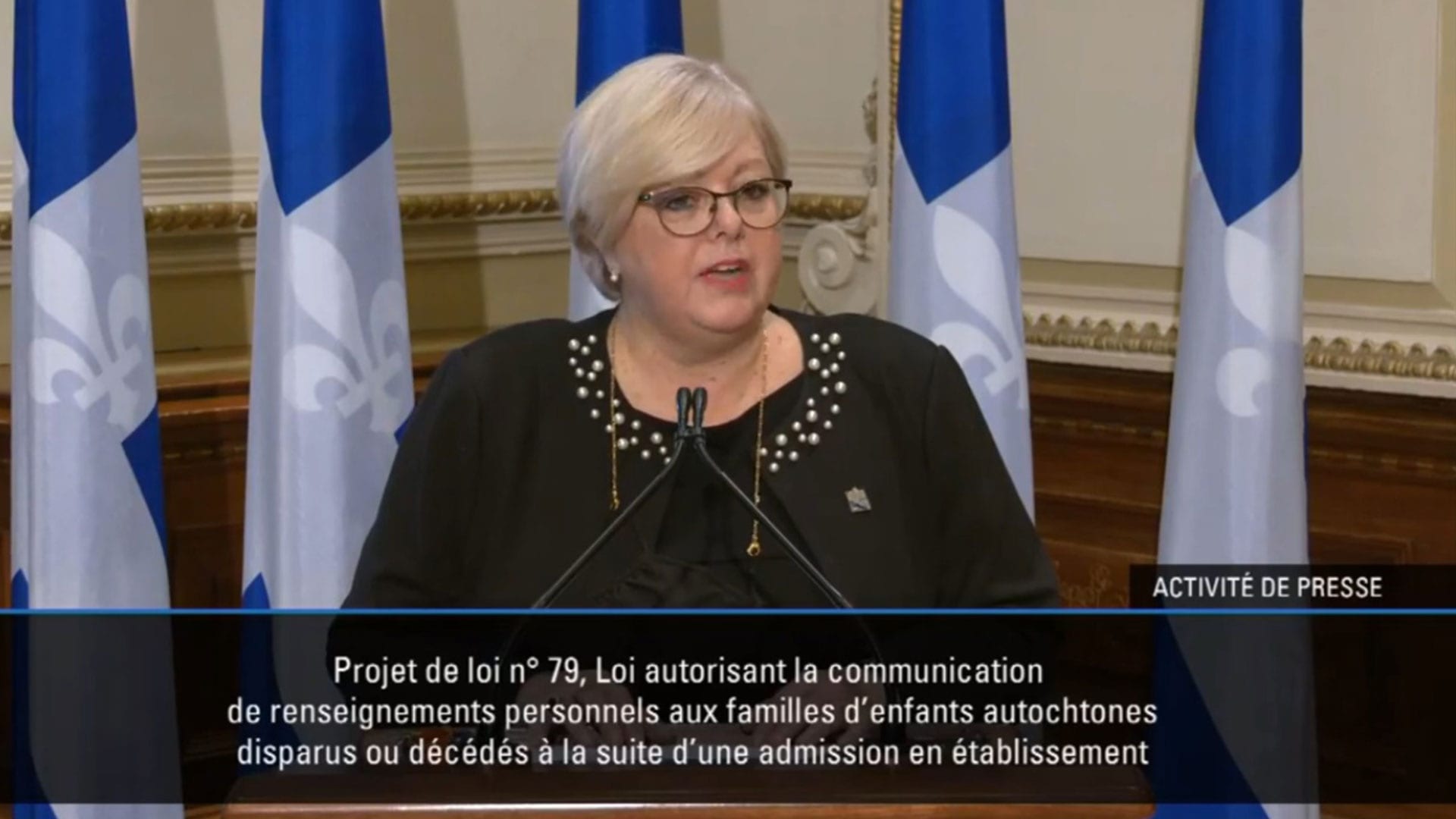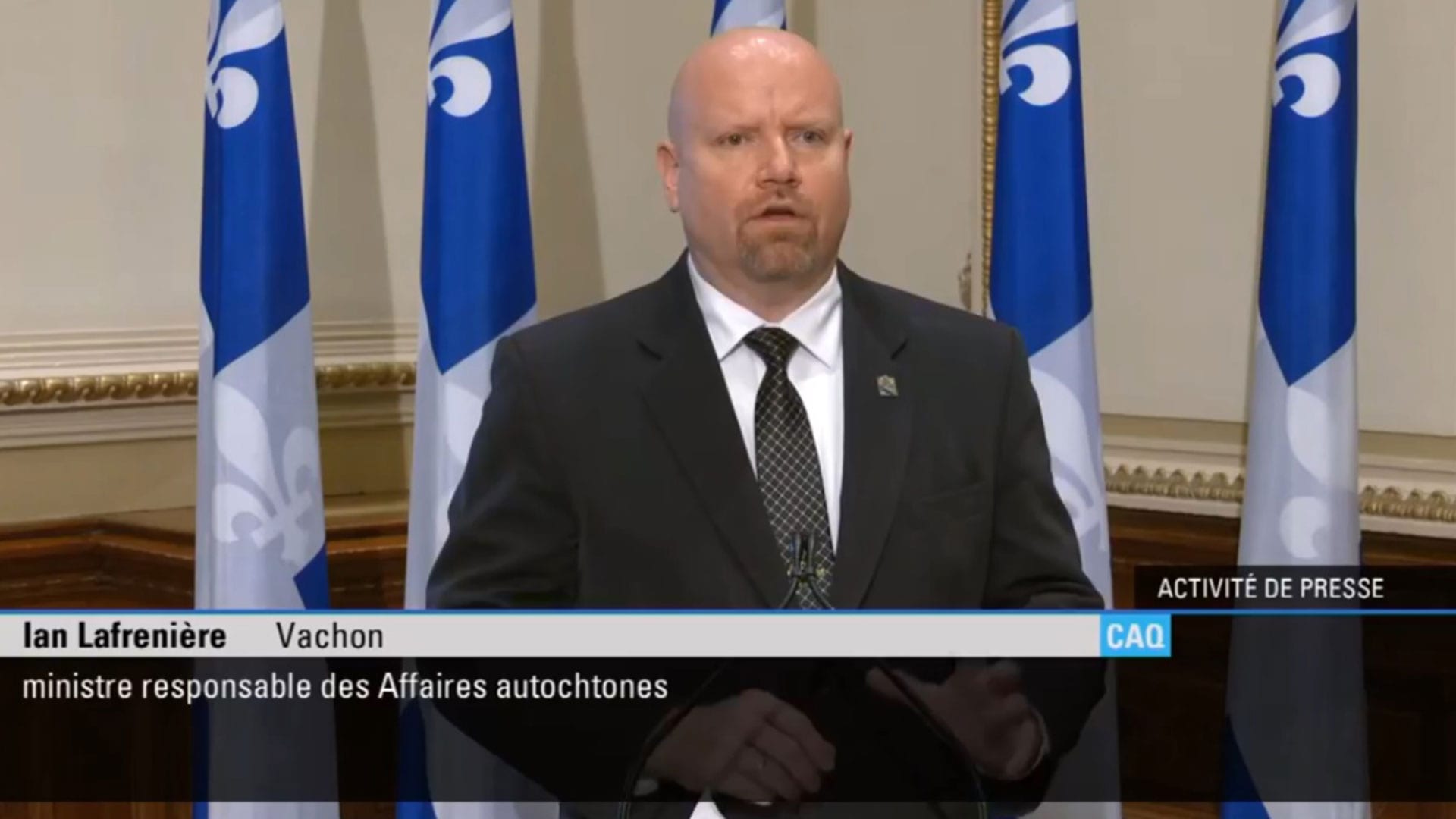It’s become known at Quebec’s National Assembly as “the Baby’s Law.”
The full title of newly-introduced Bill 79 is a mouthful: A bill authorizing communication of personal information to families of missing or deceased Indigenous children following admission to an establishment.
Despite this, Former Indigenous affairs minister Sylvie D’Amours insists its purpose is simple, find closure for First Nations families whose children were hospitalized and never returned.
“To hear about the Indigenous babies declared – sometimes late – dead, or missing, I was in shock. They have the right to know the truth,” D’Amours, also the MNA for Mirabel, told reporters in Quebec City on Tuesday.
“Like many Quebecers, I had no idea that a tragedy of this magnitude existed in Quebec.”

The story of the children now known as Quebec’s “bébés fantômes” – or ghost babies – spans approximately five decades.
Until about 1989, dozens of First Nations children went missing, or were declared dead following hospitalizations outside of their communities.
For example, it’s estimated that 47 children from the Atikamekw community of Manawan went missing, or were pronounced dead, within a 10-year period.
In just one year, eight children from the Innu community of Pakuashipi disappeared after being admitted to the hospital in Blanc-Sablon.
“The impact on the families is tremendous: depression, suffering, constant questioning, guilt, addiction, and more,” reads an excerpt from the MMIWG Inquiry’s Quebec-specific report. “The families want answers and assistance. Today, the families feel a deep sense of injustice and want their stories to be heard.”
“Every time I thought of it, my heart, as a mother, bled,” D’Amours explained.
“I [thought] ‘I need to act as a Minister.’ So I acted,” she added.
D’Amours was unseated as Indigenous affairs minister in early October after opposition leaders singled her out for lack of progress made on the Viens Commission recommendations.
Read More:
Atikamekw families in Quebec still haunted by dozens of stories of ‘ghost babies’
Before that, in November 2019, D’Amours and then-Health minister Danielle McCann collaborated on Bill 31 – an act meant, in part, to “[facilitate] access to certain services and to authorize the communication of personal information concerning certain missing or deceased Aboriginal children to their families.”
This first draft, according to D’Amours, was written based on the dates mentioned in the MMIWG inquiry’s final report.
Bill 79 will permit any First Nations family who lost a child after hospitalization, up until 1989, to initiate an information-gathering process accompanied by Quebec officials.
D’Amours, for her part, appealed to journalists to make sure this bill – and the stories that inspired it – become known to the greater population.
She says the first draft of the bill, and a public apology made on behalf of Quebec in the National Assembly, did not get the media play she anticipated.
“I’m trusting [journalists], your good words, to drum up interest for other journalists who may not otherwise be interested. But I think there will be an interest in this bill, because it’s a tragedy here in Quebec,” D’Amours said.
“The story needs to be known,” she added.
In January 2020, APTN News travelled to Manawan to hear these tragic stories firsthand.
Paul Joseph Maxime Ottawa was born there in 1954. Though he would’ve been 67 this year, he’s still referred to in conversation as “Bebe Maxime.”
At six months old, the village priest requested that Maxime be transferred to a hospital in Quebec City to assess his eczema – a normally treatable skin condition.
Without a death certificate, or a body turned over, Ottawa’s nieces – now in middle-age themselves – never gave up the search.
Pierre-Paul Niquay lost two brothers in unclear circumstances. His years-long search has not provided any additional answers: hospitals have long-destroyed their medical records, legal petitions are often struck down, and documents obtained are often sparse and full of inconsistencies.
Niquay’s wife, Viviane, told APTN’s Nouvelles Nationales her mother gave birth to twins in a sanatorium while being treated for pneumonia.
Despite hearing two babies cry at birth, a doctor reportedly returned to say the babies had been stillborn.
The fate of the eldest child of the Flamand-Dube family is, to this day, still unknown.
Little Violetta, born in 1956, was taken shortly after birth, and pronounced dead. Her birth and death certificates, however, indicate she died at almost a month old.
There are dozens more stories in this vein: stories of caskets sent home with lids screwed shut, of babies possibly adopted out, or sold for medical trials. Of “stillborn” children mothers insist were heard crying at birth.
Each story has its own complex, painful knot to unravel.
During a forum on missing babies held in Manawan in 2018, the community called for legal representation, psychological aid, and the creation of a DNA database to help with their searches.

Where Bill 79 is concerned, Quebec’s current Indigenous Affairs Minister Ian Lafreniere, says there are details still to be ironed out: budget, forming a team, as well as day-to-day protocols among them.
During Tuesday’s announcement, he offered a hypothetical scenario to explain how he envisions Quebec’s process playing out in real-time.
“So I, as a family member, find out my child is buried in ‘x’ location. You can understand there are other steps to be taken after that – will there be an exhumation? What will we do?” Lafreniere said.
“The last thing we want to do are referrals. We’re not going to say to the family, ‘here, take a number for this business, for the coroner, and good luck.’ We will work with them,” he added.
If a child is found alive, as offered in another example, Lafreniere says officials will have to respect confidentiality agreements and make first contact.
The process is not meant to replace criminal investigations, coroner’s inquiries, or other “official” investigative processes.
Lafreniere also says Quebec is not well-positioned to offer legal advice in these cases.
“We want to leave all the autonomy to these families – but we want to take care of them. I think that’s the right way to say it, to take care of these families,” Lafreniere explained.
“They’ve been waiting for years,” he added.









